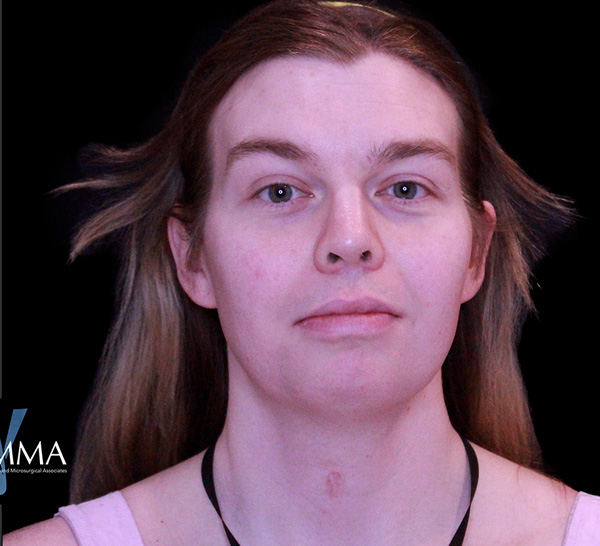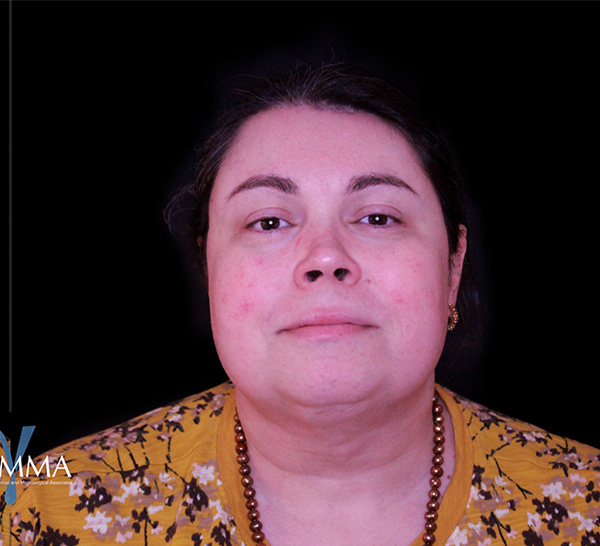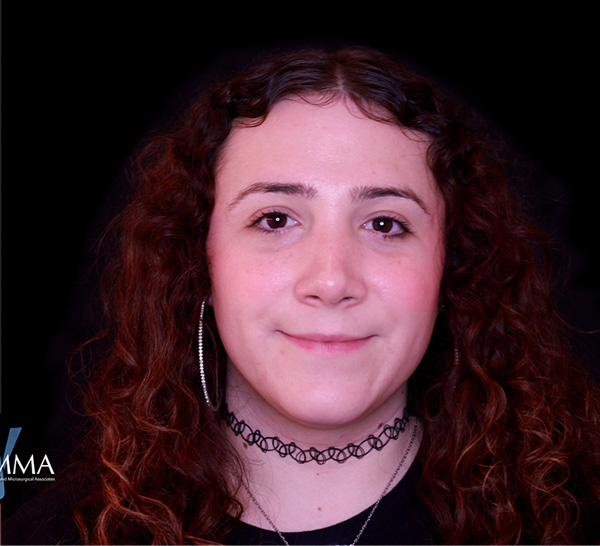What Is Hairline Advancement?
Hairline advancement surgery involves repositioning the hairline to a more desirable, feminine location. The procedure typically lowers the hairline by removing a section of scalp and then pulling it forward to create a softer, lower hairline. One of the primary goals is to convert a masculine M-shaped hairline (with prominent corners) into a feminine U-shaped hairline, which provides a more rounded and harmonious facial appearance. This procedure is ideal for individuals with a high forehead or a masculine hairline looking to achieve a more feminine, balanced look. In addition to hairline advancement, hair transplantation can be performed to create the most natural and feminine appearance possible.
Surgical Procedure
Hairline advancement surgery is performed under general anesthesia and is typically performed in conjunction with other FFS procedures. The procedure involves making an incision just above the natural hairline.
Once the incision is made, a section of the scalp is excised, and the hairline is lowered to the desired position. This involves repositioning the scalp forward, softening the appearance of the forehead and making the hairline appear more feminine. One of the goals is to not only move the hairline forward but also to reshape it into a more rounded U-shape, reducing the sharpness of the corners that are typically more masculine.
After the repositioning, the incision is carefully sutured to minimize visible scarring. A drain will be placed after the surgery to prevent fluid accumulation and will be removed the following day.
Who Are the Best Candidates?
The best candidates for hairline advancement surgery are individuals who have a high or recessed hairline, or those whose hairline contributes to a more masculine appearance. The procedure is also ideal for those looking to improve the overall proportions of their forehead and achieve a more feminine facial aesthetic. A patient’s general health, expectations, and surgical goals will be considered during the consultation to determine the suitability for surgery.
How Should I Prepare for Hairline Advancement?
The first step in facial feminization surgery (FFS) is to meet with Dr. Marano or Dr. Keith for a private consultation at GAMMA in New York City or New Jersey. During this time, you will discuss your goals and medical history with our team, who will then create a customized treatment plan according to your unique anatomy, comfort levels, and goals. Prior to consultation, you should ensure the following:
- Provide Mental Health Letter – Many insurance providers and surgical guidelines require a letter from a qualified mental health professional confirming a diagnosis of gender dysphoria and the patient’s readiness for surgery. This letter should follow WPATH (World Professional Association for Transgender Health) standards and address the patient’s understanding of the procedure and its implications. Our team will assist in ensuring the proper language is used and the provider is appropriately credentialed
- Quit Smoking – Nicotine constricts blood vessels and significantly increases the risk of complications, including poor wound healing and tissue loss. Patients must stop using all nicotine products—including cigarettes, vapes, nicotine patches, and gum—at least 4-6 weeks before and after surgery.
- Manage Medications – You may be asked to discontinue certain medications that increase surgical risks.
Well-Controlled Medical or Mental Health Issues / - Medical Clearance – To ensure safe surgery and recovery, patients with underlying medical conditions such as diabetes, high blood pressure, or psychiatric conditions should have them well-managed. Medical clearance from a primary care provider or specialist is required.
- BMI Cutoff – There is no strict BMI cutoff for FFS at GAMMA. Every patient is evaluated individually, considering overall health and surgical goals rather than BMI alone.
- Insurance Coverage – GAMMA works with various insurance providers to help patients access gender-affirming surgery. Our team assists with insurance verification, prior authorization, and necessary documentation. Patients should check with their insurance carrier regarding coverage criteria, including mental health letters and medical clearance requirements.
- Complete Your Consultation – You will undergo a detailed consultation with Dr. Marano or Dr. Keith to ensure your expectations are realistic and your health supports the treatment process. Our team will discuss the risks and benefits, recovery and results, of FFS.
What to Expect On the Day of Surgery
On the day of surgery, you will be given general anesthesia to ensure comfort throughout the procedure. Hairline advancement is typically done in conjunction with other FFS procedures. The length of the surgery will depend on what other procedures you are undergoing that day. Once the procedure is complete, you will be closely monitored in a recovery room before being discharged.
Recovery
Recovery times can vary from patient to patient depending on your unique healing abilities, the specific techniques utilized by Dr. Marano and Dr. Keith, and whether any other treatments are performed at the same time. Recovery from hairline advancement surgery typically involves a 1-2 night hospital stay if combined with other facial feminization surgeries. Patients can expect to experience some swelling, bruising, and mild discomfort, especially during the first week. A special head dressing is worn to support the scalp and reduce swelling.
- Activity Restrictions: For 2 to 4 weeks, patients should avoid strenuous activities, including exercise and heavy lifting, to prevent complications.
- Return to Work: Most patients can return to work after 4 weeks, though it may take longer for complete healing.
- Swelling and Final Results: While swelling and bruising will subside in the first few weeks, final results may take 12-18 months as the scalp fully heals and the new hairline settles into place.
Insurance Considerations & Requirements
Insurance carriers will typically cover gender affirmation surgery, including facial feminization surgery, when it is performed to treat gender dysphoria, a condition in which the patient’s outer traits do not reflect their authentic gender identity. You’ll need a letter from a mental health provider detailing your decision to undergo FFS. Our team can go over the insurance requirements in greater detail during your consultation.
Traveling from Outside the NYC Area
- Resources – For patients traveling to NYC for surgery, GAMMA provides recommendations for LGBTQ+ friendly accommodations, post-op caregivers, and recovery services. Our team can also assist with logistics such as medical transport and aftercare arrangements.
- Requirements – Out-of-town patients must plan to stay in NYC for at least two weeks after surgery to ensure proper healing and attend necessary post-operative appointments. We encourage having a trusted friend, family member, or professional caregiver for the first few days post-surgery.
What Sets Us Apart?
Our team at Gender Affirming Medical and Microsurgical Associates (GAMMA) in New York City and New Jersey is known for providing the highest-level care in an affirming environment. We utilize today’s most progressive and cutting-edge techniques to provide the highest level of service possible. Our goal is to help transgender, nonbinary, and gender nonconforming individuals achieve their unique appearance goals and thrive with confidence, security, and peace of mind.
Dr. Drew Marano
Dr. Drew Marano is an accomplished, board- certified, and fellowship-trained plastic and reconstructive surgeon who has devoted his career to the art of gender affirmation surgery. He graduated from Rutgers New Jersey Medical School at the top of his class, receiving AOA honors before embarking on a competitive six-year Integrated Plastic and Reconstructive Surgery Residency at Columbia University/Cornell University in New York City. Following his residency, Dr. Marano was selected as the first-ever Harvard University Complex Gender and Microsurgery Fellow, during which time he underwent advanced training in groundbreaking and innovative surgical techniques. He is a prolific author, researcher, and lecturer who has contributed to over 40 publications and presentations at regional and national meetings. Dr. Marano offers ongoing support for transgender patients as they navigate their unique and rewarding journey of transitioning.
Dr. Jonathan Keith
Dr. Jonathan Keith is a renowned, fellowship-trained, board-certified plastic surgeon known for his progressive approach to microvascular surgery. He is an active member of the World Professional Association for Transgender Health and the founder of the Rutgers Center for Transgender Health. In 2018, Dr. Keith created the first multidisciplinary clinical program for transgender patients in New Jersey and was the first surgeon in the state to perform a female-to-male phalloplasty for gender affirmation. Regarding his extensive educational background, Dr. Keith completed a demanding seven-year residency at the University of Pittsburgh, one of the nation’s most elite and well-regarded plastic surgery training programs. As a testament to his skill and artistry, in 2012, he received the Stephen S. Kroll Fellowship in microsurgery at the University Hospital of Gent, Belgium. Today, Dr. Ketih performs a range of complex and delicate procedures to assist transgender and nonbinary individuals in achieving their ideal appearance, including DIEP flaps for breast reconstruction, vaginoplasty, and phalloplasty.
What Are the Risks?
The risks and complications of hairline surgery may include the following:
- Bleeding: Some bleeding is expected during the procedure, but it is generally controlled with careful surgical techniques.
- Infection: As with any surgical procedure, there is a risk of infection, which can be managed with proper care and antibiotics.
- Scalp Numbness: Some temporary numbness in the scalp may occur, but it typically resolves over time.
- Swelling and Bruising: These are common side effects following surgery and usually subside within a few weeks.
- Pain: Mild discomfort is common, but it can be managed with prescribed pain medications.
- Scarring: The incision will leave a scar, but it is typically well-hidden along the hairline and will fade over time.







